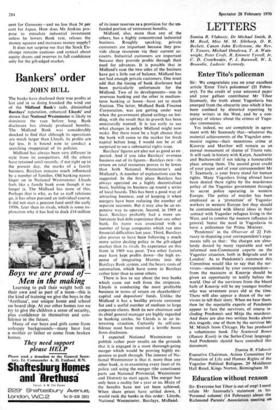Bankers' order
JOHN BULL
The banks have disclosed their true profits at last and in so doing knocked the wind out of the Midland Bank's sails, diminished Barclays' reputation, enhanced Lloyds' and shown that National Westminster is likely to dominate the race before long. Bank disclosure has already produced benefits. The Midland Bank was considerably shocked to find that although its operations are much larger than Lloyds, its profits are far less. It is bound now to conduct a searching reappraisal of its policies.
Midland has always been very different in style from its competitors. All the others have retained until recently, if not right up to the present day, the marks of a family business. Barclays remains much influenced by a number of families. Old banking names linger on in National Westminster. Lloyds feels like a family bank even though it no longer is. The Midland has none of this. Perhaps that is why, as far as staff relations go, it has often pursued an individual course. It did not start a pension fund until the early 1950s, later than its rivals, which is some ex- planation why it has had to dock fl4 million
of its inner reserves as a provision for the un- funded portion of retirement benefits.
Midland, also, more than any of the others, has a highly concentrated industrial business. Roughly speaking, private customers are important because they pro- vide cheap resources via their current ac- counts. Industrial customers are important because they provide profits through their need for advances. It is possible that in Midland's case the two sides of the business have got a little out of balance. Midland has not had enough private customers. One must add that the timing of bank disclosure had been particularly unfortunate for the Midland. Two of its developments—one in overseas banking and the other in medium- term banking at home—have yet to reach fruition. The latter, Midland Bank Finance Corporation, was just getting under way when the government placed ceilings on len- ding, with the result that its growth has been unnaturally stunted. It is too early to say what changes in policy Midland might now make. But there must be a high chance that the bank will come to the market for fresh capital before long. I would not be at all surprised to see a substantial rights issue.
Barclays' figures are also not as good as ex- pected. And if you take Barclays' overseas business out of its figures—Barclays Dco--its return on total resources proves to be lower than both National Westminster's and Midland's. A number of explanations can be suggested. In the first place Barclays has always operated on a highly decentralised basis, building its business up round a series of local boards. This has been a good way of attracting business, and of keeping it when mergers have been reducing the number of separate accounts. But it may also be an ex- pensive way to operate. Second, in 1969 at least, Barclays probably had a more un- fortunate bad debt experience than any other bank. Its name was associated with a number of large companies which ran into financial difficulties last year. Third, Barclays also proves to have been following a much more active dealing policy in the gilt-edged market than its rivals. Its experience on this front in 1969 was poor. Two other factors may have kept profits down—the high ex- pense of integrating Martins into the Barclays Bank system, and the heavy costs of automation, which have come to Barclays rather later than to some others.
There is less to say about the two banks which came out well from the striptease. Lloyds is conducting the most profitable business in terms of return on shareholders' capital and depositors' funds. Unlike the Midland it has a healthy private customer list and a useful number of medium to large corporate clients. Both its new chairman and its chief general manager are highly regarded in banking circles. So Lloyds is in an in- teresting situation. Certainly its self-con- fidence must have received a terrific boost from disclosure.
I expected National Westminster to publish rather poor results on the grounds that it is engaged in a most thorough-going merger which would be proving highly ex- pensive to push through. The interest of Na- tional Westminster is that it, more than any other bank, is re-examining every facet of its policy and using the merger (the constituent parts are National Provincial, Westminster and District) to start again. The merger has only been a reality for a year or so. Many of the benefits have not yet been achieved. When share prices have settled down, I would rank the banks in this order: Lloyds, National Westminster, Barclays, Midland.


































 Previous page
Previous page